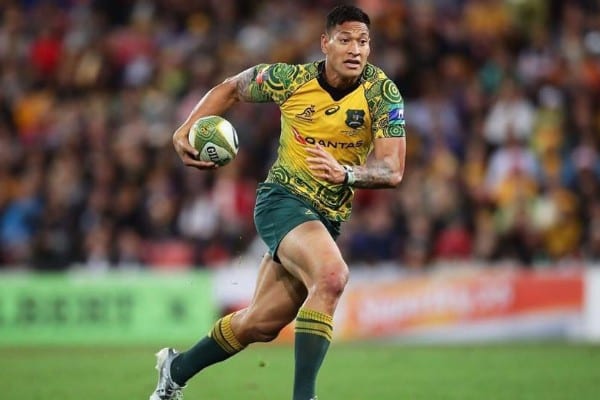Rugby Australia issued Folau with a breach notice, advising him of their intention to sack him for sharing material that “condemns, vilifies or discriminates against people on the basis of their sexuality”.
The irony is that Folau may now have grounds to claim unfair dismissal for his religious views, even though his post arguably constitutes hate speech against gay people.
Folau will now take part in a Code of Conduct hearing, where he has the chance to ‘plead his case’ in front of an independent three-person panel before RA make their final decision.
Broadcaster Alan Jones argues that RA’s intention to sack Folau is a ‘slippery slope’ for free speech in Australia.
“Out there, people now are terrified of saying anything; they don’t know what they can say,” he said on his 2GB radio talk show.
But what about free speech that infringes other people’s basic rights to safety?
Former broadcaster Kim Baker Wilson suffered brain damage after he was attacked on the street and called a ‘faggot’.
His injuries were so severe that he went through speech therapy for years afterwards, was forced to leave his job and still experiences serious side effects from his attack.
In a piece published on The Guardian, Baker Wilson shared his profound fear that Folau’s religious views – which have been sanctioned in the past – pose a genuine threat to the safety of gay people:
“What some people see as freedom of expression, I see as a vehicle for hate and prejudice… Freedom of speech doesn’t need to cross a line into speech that spreads hate and puts people in harm’s way,” he wrote.
“I don’t need anyone to tell me I’m going to hell, I’ve already been. And there are people who are hurt far worse by people who think there’s nothing wrong with wounding a gay person. At least I’m here.”
This isn’t the first time that Folau has been in the spotlight for sharing homophobic content on social media.
Last year, after sharing a religious post on his Instagram page, one user asked Folau for his opinion on ‘God’s plan for gay people’.
Folau’s response was to share a passage from the bible stating that homosexuals, as well as ‘the sexually immoral, idolaters, adulterers, thieves or revilers’ would not inherent the kingdom of God.
That incident also prompted backlash from senior executives within RA, including CEO Raelene Castle, who met with Folau and advised that his views clashed with the public stances of RA, their sponsors and the broader community.
At that time, Folau wrote a piece on PlayersVoice, where he stated his intention to walk away from rugby if his position became ‘untenable’:
“After we’d all talked, I told Raelene if she felt the situation had become untenable – that I was hurting Rugby Australia, its sponsors and the Australian rugby community to such a degree that things couldn’t be worked through – I would walk away from my contract, immediately.”
Folau’s former stance, however, directly contradicts his current position, deciding instead to challenge RA on their decision to terminate his contract.
Falou’s Instagram account is set to ‘public’, so it’s safe to assume he knew his decision to post homophobic content would have public ramifications. Knowing that his personal opinions ran contrary to his employer, and having been reprimanded for a similar incident before, it’s hard to believe Folau didn’t know there would be consequences.
Falou’s inconsistency on his position, however, is not the only one to raise eyebrows.
The NRL has also been criticised by former player Brett Finch for supporting RA for their decision to terminate Folau, while having a well-documented history of letting ‘convicted criminals come back to the game’.
We’ve covered the NRL’s flip-flopping stance on domestic violence, but they are far from alone in welcoming back male athletes for on or off-field bad behaviour.
Last week, US golfer Tiger Woods made history for winning his fifth Masters – his first in over a decade.
The bulk of the news coverage on his victory verged on evangelical; Michael Jordan called it ‘the greatest comeback’ he’s ever seen.
Tiger Woods had a long-held reputation for being a good guy – and at the Masters he was given a platform to re-cement that reputation, embracing his son after the win:
“My dad was here in 1997 and now I’m the dad with two kids here.”
“I did the same thing to my dad and now I’m the dad with my son doing the same thing. It’s amazing how life evolves, changes,” he said.
This is the same golfer who was infamously caught cheating on his now ex-wife with countless women, and who was booked by police for an opioid DUI.
Sporting codes have long been willing to overlook the indiscretions of athletes, most likely because of the commercial value and popularity of those stars.
Rugby Australia’s hardline stance on Folau is different. It sends a positive message to players and fans alike: that as a representative of the sport, athletes do not have a right to target vulnerable groups that negate their codes’ – or our broader society’s – values.


